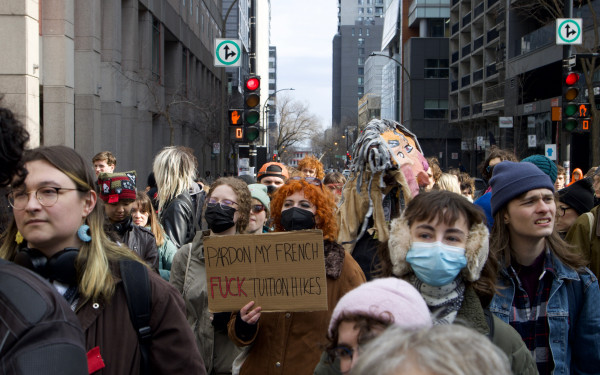Concordia Reluctant to Discuss Plans for International Tuition
University to Announce Response to Deregulation on May 28
Concordia President Alan Shepard recently announced the university will lose “millions in funding” as the provincial government begins cutting grants for international students next school year. Since then, the university has been unable to answer exactly how much funding they project they will lose.
“This is precisely the type of calculation we are currently working on for our upcoming proposal to the Board of Governors,” wrote Chief Financial Officer Denis Cosette to The Link.
While it’s true universities across Quebec will be seeing cuts in provincial funding, a 2018 study by the Institut de recherche et d’informations socioéconomiques projects McGill, Concordia, and Université de Montréal actually stand to gain more from deregulation with significant increases their revenue.
“Deregulation creates a significant imbalance between universities, as some among them, especially the English-speaking universities, will get much more revenue than Francophone universities,” the study writes. “Not only does deregulation place universities in a hunt for recruitment, it also gives some institutions a considerable advantage.”
Starting Sept. 1, universities across Quebec will no longer have any limits on how much they can charge international students —with exception to PhD students and those taking thesis-based master’s programs.
The deregulation of tuition comes with a loss in grants and, to make up for that, universities will now be able to keep 100 per cent of the tuition they receive from international students impacted by the deregulation.
“The government is deciding they no longer want to take up the responsibility of providing affordable and accessible education,” said student representative on the Board of Governors Eunbyul Park. “They see the access to higher education as a privilege rather than a right.”
“It’s putting more burden on the shoulders of students, or as the university likes to call us, clients.”
Previously the majority of tuition fees gained from international students was redistributed throughout the province to other universities. With the redistribution lost, universities across Quebec will see a $95.7 million reduction in funding for the 2019-2020 school year.
Coupled with an extra $366.7 million in provincial funding proposed for Quebec universities by 2022-2023, the study notes McGill, Concordia, and UdeM stand to gain the most since they tend to retain and attract the largest numbers of international students.
The study’s projections assume the Coalition Avenir Québec will follow through on every part of the previous government’s university funding plan, which proposes $1.5 billion extra in funding over 2019 and 2023.
Shepard said the CAQ indicated to them their intention is to follow the Liberals’ plan. “I know there will be some changes to it, but there weren’t any surprises this spring in the budget.” The education ministry was unable to confirm with The Link wether they’ll follow the plan, and declined to comment.
Concordia’s Response
The Board of Governors is expected to announce and vote on their response to the deregulation on May 28.
Shepard has avoided any discussion on which programs they’re considering increasing international tuition in.
“Programs that cost more to run will also have higher international tuition,” Shepard told The Link in a recent interview. “The ones that are typically more expensive are engineering and the sciences, and sometimes business.”
With that, it appears departments in arts and sciences are less likely to see hikes.
“I was the first in my family to go to university, I promise you, we’re very conscious of the financial burdens of students, whether it’s domestic students or international students. We’re not sitting around trying to squeeze every last dollar out of people,” he continued.
“We’re always struggling to balance, ‘How can you offer a quality of education for the prices you think are fair to set?’ It’s a complicated process.”
But with little financial information being shared with the community, Park said it’s unclear whether the university stands to turn a profit from increasing tuition or whether hikes will serve to balance their budget.
Cosette declined to say how much Concordia received in provincial grants for international students this school year. For 2018-2019, the university received $320 million in provincial grants, though it’s unknown what portion of this grant was allocated to cover the cost of education for international students.
Park said she worries the Board of Governors will rubber-stamp tuition hikes without making an informed decision. She also expressed concern over the university’s finance committee, since members are bound by confidentiality agreements.
“Concordia needs to release their operating budget for the entire 2018-2019 year,” she said.
She also wants the university to consult with students before agreeing on their plan in response to deregulation.
Over 2,600 students have signed a petition demanding a freeze on international tuition.
They’re also demanding the university take a public stance against the provincial government’s move to privatize education for international students. Shepard said the university won’t be following through on that.
For Park, the move to deregulate international tuition reflects a larger trend towards the privatization of all higher education.
She fears Quebec and Canadian students could be next to see their tuition deregulated. “It’s really scary.”
Shepard stressed most provinces in Canada have already moved to deregulate international tuition.
“Quebec has long taken a slightly different direction from the rest of Canada, and I think that’s still true,” Shepard said. “[But] on the international side, now you’re going to see Quebec become more like the rest of Canada.”

-750x500.png)


-750x500_600_375_s_c1.png)


